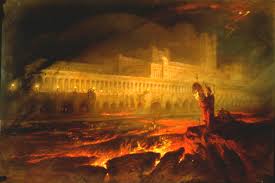pandemonium
[,pændə'monɪəm]
GRE
- pandemonium
- pandemonium: [17] Pandemonium was coined by John Milton as the name for the capital of Hell in his poem Paradise lost 1667: ‘Meanwhile the winged heralds … throughout the host proclaim a solemn council forthwith to be held at Pandaemonium, the high capital of Satan and his peers’. He formed it from the prefix pan- ‘all’ and Greek daímōn ‘demon’ – hence ‘place of all the demons’. The modern colloquial use of the word for ‘uproar’ developed in the mid-19th century.
=> demon - pandemonium (n.)
- 1667, Pandæmonium, in "Paradise Lost" the name of the palace built in the middle of Hell, "the high capital of Satan and all his peers," coined by John Milton (1608-1674) from Greek pan- "all" (see pan-) + Late Latin daemonium "evil spirit," from Greek daimonion "inferior divine power," from daimon "lesser god" (see demon).
Transferred sense "place of uproar" is from 1779; that of "wild, lawless confusion" is from 1865. Related: Pandemoniac; pandemoniacal; pandemonian; pandemonic.
- 1. There was pandemonium in court as the judge gave his summing-up.
- 法官的结案陈词在法庭上引起一片混乱。
来自柯林斯例句
- 2. Pandemonium broke out as they ran into the street shouting.
- 他们叫嚷着冲到大街上,大街上顿时乱作一团。
来自柯林斯例句
- 3. Pandemonium broke out when the news was announced.
- 这消息一宣布,立即乱成一片。
来自《权威词典》
- 4. The whole lobby was a perfect pandemonium, and the din was terrific.
- 整个门厅一片嘈杂, 而且喧嚣刺耳.
来自《简明英汉词典》
- 5. Shrill cries and startled oaths flew up around us as pandemonium broke out.
- 骚乱爆发时,我们周围充斥着尖厉的哭喊声和难以入耳的咒骂声。
来自柯林斯例句
[ pandemonium 造句 ]
